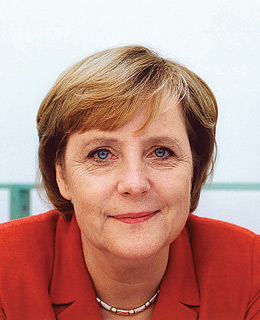
Angela Merkel
In 1989 Angela Merkel was working as a researcher in physics at the Institute for Physical Chemistry, East German Academy of Sciences in East Berlin. She had never participated in political activity. Then the Berlin Wall fell, and shortly afterward, Merkel joined the Christian Democratic Union of East Germany. By 2000 she had been elected chairperson of the Christian Democratic Union of a unified Germany. In 2005 she became Chancellor.
Merkel's leadership style is the art of accomplishing great goals through the accumulation of nuance. Thoughtful but tenacious, she moves toward her goals with inward assurance. In foreign policy she has balanced Germany's close relations with the U.S. and the necessity of cooperation with Russia. In the rotating office of the European Union presidency, she has given a new impetus to European integration. If gradualism becomes too pervasive, she will run the risk of stagnation. But I think that Merkel, 52, will push reform to the point of inevitability, softening her determination by unobtrusiveness and an aura of competence. If that happens, Merkel will have become a German equivalent of Britain's Lady Margaret Thatcher—different in style yet comparable in results.
Kissinger is a former U.S. Secretary of State